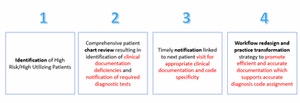Clinical Documentation Improvement is not new in the healthcare world. In fact, the process has been occurring in hospitals around the country for decades. Traditionally, the role of CDI professionals has been to act as a liaison between providers and inpatient coders since communication between these two parties can often be difficult as they typically do not speak the same “language.” A CDI professional has the ability to review a providers notes prior to the coder ever receiving it, allowing any ambiguities to be resolved, alleviating these communication issues.
Customarily, CDI has only been performed in inpatient settings, as the outpatient setting was not considered a good candidate because of high patient volume, leading to time constraints and patient visit irregularity. However, on January 1st 2020, CMS will implement a reimbursement adjustment to all physician’s fee schedules (that are not a part of the any value based programs) based on the Hierarchical Condition Category (HCC) and Risk Adjustment Factor (RAF) scores of their patient population. This means that reimbursement from CMS will increase with higher RAF scores and decrease with lower RAF scores. With this in mind, physicians will need a partner to help them identify areas/patients where they can improve their documentation to ensure that their HCC and RAF scores are optimal and accurate leading to appropriate reimbursement.
As you and your organization weed through the changes of HCCs and RAF scores, Lighthouse Healthcare Advisors would love to be the trusted partner that helps you identify areas of improvement in your clinical documentation. With our four step program we can help to alleviate stress and uncertainty and assist in keeping you compliant and appropriately reimbursed, in our ever changing healthcare world.

Content retrieved from: https://lighthousehealthcareadvisors.com/post/the-growing-need-for-cdi.


